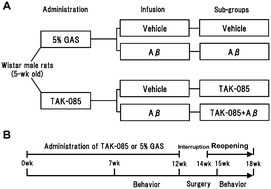Scientists from Shimane, Japan, have investigated the effects of n-3 fatty acids on cognitive functions and learning ability impairments in an animal model of Alzheimer’s. These n-3 fatty acids, found in foods such as salmon and tuna, have recently been associated with reduced risk of neurological diseases such as Alzheimer’s and can also lower the possibility of developing cardiovascular disease.
 In this study, an animal model of Alzheimer’s was treated with TAK-085 (highly purified and concentrated n-3 fatty acids containing eicosapentaenoic acid ethyl ester and docosahexaenoic acid ethyl ester) for 12 weeks. The rats behaviour and memory functions were assessed by their completion of an 8-arm radial maze task. The results showed that the memory errors performed during the task were significantly reduced during the treatment period, and suggests that TAK-085 can be used as a possible therapeutic agent for protecting against AD-induced learning deficiencies.
In this study, an animal model of Alzheimer’s was treated with TAK-085 (highly purified and concentrated n-3 fatty acids containing eicosapentaenoic acid ethyl ester and docosahexaenoic acid ethyl ester) for 12 weeks. The rats behaviour and memory functions were assessed by their completion of an 8-arm radial maze task. The results showed that the memory errors performed during the task were significantly reduced during the treatment period, and suggests that TAK-085 can be used as a possible therapeutic agent for protecting against AD-induced learning deficiencies.
Read the full article for free by following the link below:
Protective effects of prescription n-3 fatty acids against impairment of spatial cognitive learning ability in amyloid b-infused rats, M. Hashimoto, R. Tozawa, M. Katakura, H. Shahdat, A. Md. Haque, Y. Tanabe, S. Gamoha and O. Shidoa, Food Funct., 2011, DOI: 10.1039/c1fo00002k










